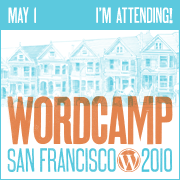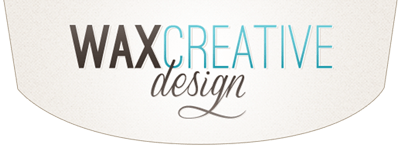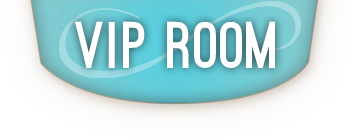WordCampSF 2010: State of the Word and SEO News
 Earlier this month, Misono and I attended WordCampSF 2010 at the Mission Bay Conference Center on May 1st. It was incredibly informative, with lots of information for upcoming features for WordPress 3.0! (Very exciting for us WP nerds. 😉
Earlier this month, Misono and I attended WordCampSF 2010 at the Mission Bay Conference Center on May 1st. It was incredibly informative, with lots of information for upcoming features for WordPress 3.0! (Very exciting for us WP nerds. 😉
First, What the Heck is WordCamp?
It’s an annual conference organized by our techie community in SF (though there are WordCamps all over the world), focusing on all things related to WordPress. There are great speakers, ranging from the original developers of WordPress to Google employees to eccentric social media advisers.
The State of the Word with Matt Mullenweg
Matt Mullenweg is the founding developer of WordPress, and I absolutely LOVE hearing him speak! His presentation was so creative, drawing similarities between WordPress’ open source environment to jazz, where everyone works together to create one beautiful piece, and even plugin developers are the jazz “soloists.” He uses four adjectives to compare WordPress to jazz:
- Improvised
- Independent
- Inclusive
- Inspired
His presentation was very inspiring and helped me understand how WordPress IS a collaborative community with its open-source nature, with folks helping each other out. There’s a reason why WordPress’ documentation and forums are so incredibly helpful!
The juicy news: What are a few new features in WordPress 3.0?
- WordPress Mu and WordPress will be merging! I believe there were a few features that weren’t available to WP Mu before, so this is pretty exciting! Many folks that use WP Mu are able to have separate blogs using one WP install—a lot of schools are beginning to do this with different blogs for each of their departments.
- Droplist subnav menus can be created/managed thru the WP Dashboard!
- There will be a new feature where you can upload an image as your “featured image” for your posts. This would be the main visual image used for your post.
- A new default theme! Kubrick has been WP’s default theme for many years now, and we’ll miss it, but it was great to see the new default theme, Twenty Ten. You can check it out here too! Definitely more modern, more visual with its large graphic header, and much more customizable to fit a vast audience with different site needs.
Want to read up on more features that will be coming with 3.0? Check out BloggingPro’s recap with additional highlights.
WordPress, Audience, Engagement, and SEO with Vanessa Fox
Vanessa previously created Google’s Webmaster Central, which provides both tools and community to help website owners improve their sites to gain more customers from search. She gave us an update on current SEO trends and what we should (and shouldn’t) care about for our site searchability.
Things you should keep in mind when managing your site’s SEO:
- Search engines are now the primary method of navigating the web
- Consider the difference between “search” and “browse”:
- Search — entails you have a goal and task to achieve
- Browse — implies that you don’t have a set goal, but freely scrolling through. The new method of browsing now is via social networking. Example: checking your Facebook feeds and Twitter lists in the morning
- Titles: Be sure to title your pages/posts! This is the text that will appear in the search results. Ideally, make sure your title appears first before your site name. The reason why this works: when we scroll through search results page in a search engine, we scroll down the left side of the page to look for our key words. If those key words don’t appear on the left-most side of the search results, we usually skip and glaze right past results we think aren’t relevant.
- Google will be phasing out tags and keywords—these will not be the main determinant for your SEO in the future. My thoughts: This makes sense. Tagging and adding in keywords has become too arbitrary, where anyone can add any words to their posts, even when the tag doesn’t relate to the content of the post. e.g. spammers
- I’ve heard the same thing repeated at several tech conferences recently regarding SEO:
- Write compelling content — it’s ALL in the content. This is the most important factor in getting people to come to your site.
- Understand Your Audience — this means understanding the language of your visitors. For instance, if your site is about climate change, be sure to include related words like “global warming”. These are related words that people from your audience may use to search. You want to make sure you have these bases covered so they can find your post!
- Community — link to resources and sites of fellow bloggers in your field while you blog and post. Everyone loves a linkback! It’s a great way to connect.
The Blog Doctor sums up Vanessa’s points in a handy list of 12 Quick, Easy Tips to Optimize Blogs / Websites for SEO if you’d like more info about Vanessa’s presentation.
6 thoughts on “WordCampSF 2010: State of the Word and SEO News”
Comments are closed.





I am trying to start my first blog. WordPress of course. This is all very helpful. I just went in to my not yet live blog and titled my pages (hadn’t gotten there in the WordPress for dummies book yet). Thanks! I think Wordcamp would be over my head, though.
WordCamp was a great experience! Thank you Estella for suggesting we go, and thank you Emily for covering registration for us! 🙂
Oh goodness, of course. I wish I could have gone myself. I love that the wax design team wants to go to these types of events.
Ooooh, I’m so jealous!! I can’t wait for WordCamp in LA!!
I think there’ll be a lot of great panels for you at WordCamp LA, Abi!
Very educating write up, bookmarked your website in interest to read more information!